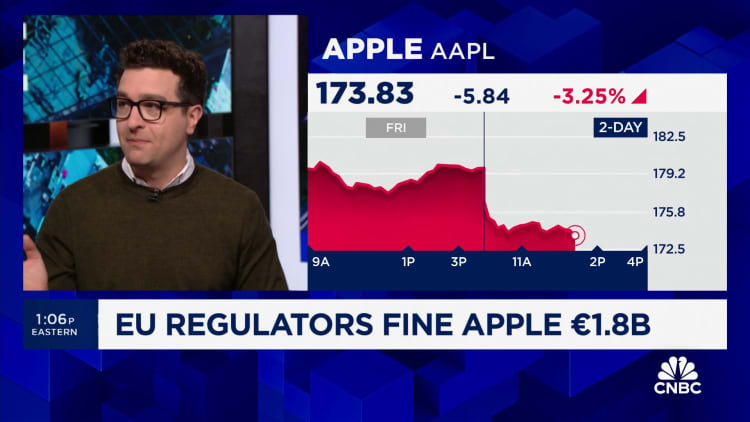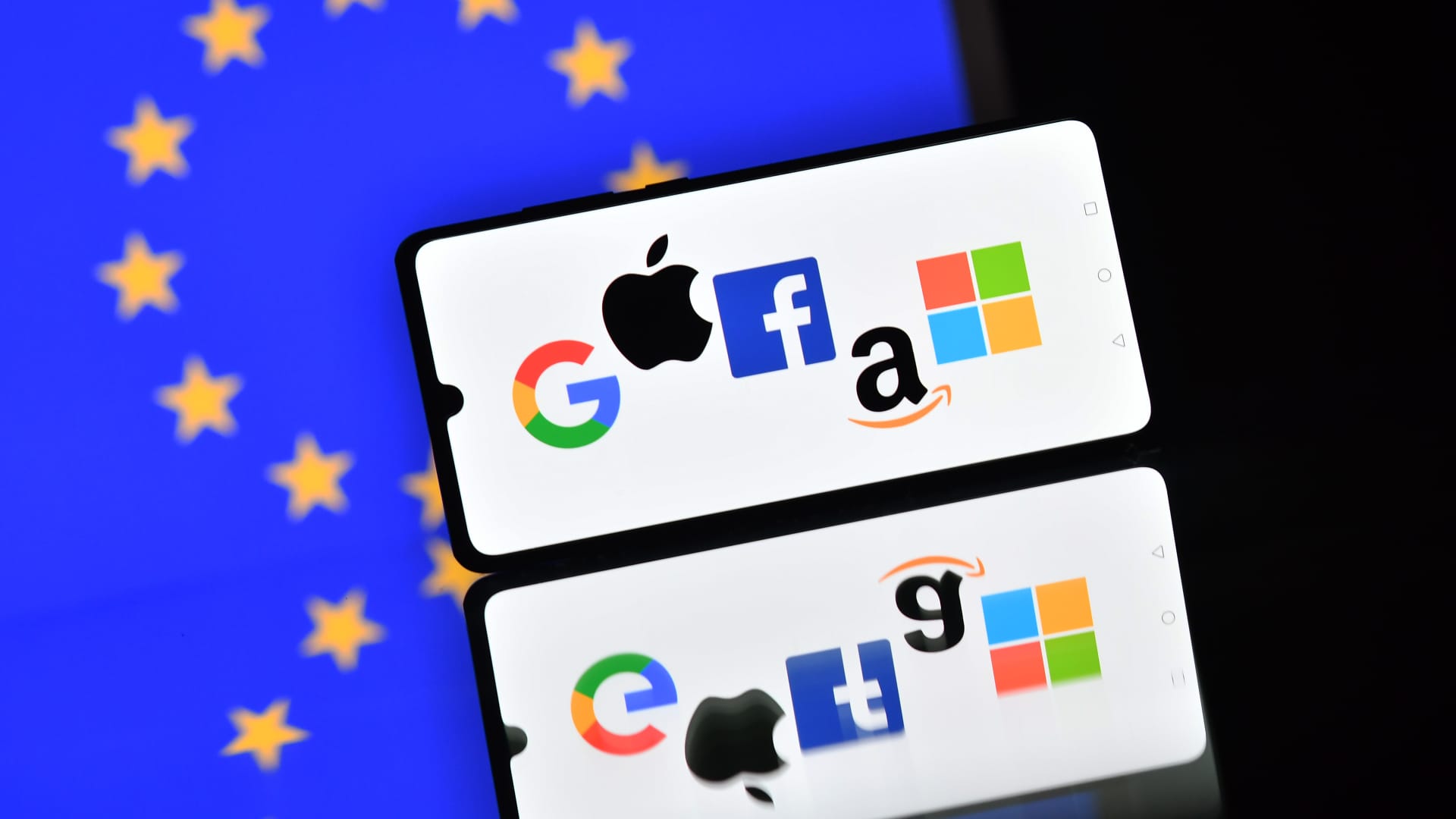The logos of Google, Apple, Facebook, Amazon and Microsoft displayed on a mobile phone with an EU flag pictured in the background.
Justin Tallis | AFP via Getty Images
An EU law that seeks to rein in large digital companies has officially kicked in, spelling big changes for primarily U.S. tech giants.
The European Union’s landmark Digital Markets Act officially became enforceable on Thursday. That means the European Commission, the EU executive arm, can start taking action against companies that breach the rules.
The Digital Markets Act aims to clamp down on anti-competitive practices from tech players, as well as force them to open out some of their services to other competitors. Smaller internet firms and other businesses have complained about being hurt by the practices of these companies.
Bill Echikson, a non-resident senior follow at the Center for European Policy Analysis (CEPA), said that the EU reforms mean that technology giants will graduate from “teenagers” to “grown-ups” now.
“There’s a lot of changes that could or could not happen. A lot of it is uncertain,” Echikson said. But, he added, the new law could inspire change in other countries, like the U.S. and the U.K. and ultimately force tech firms into global tweaks to their platforms.
CNBC runs through how the law impacts large U.S. tech companies — as well as consumers in the EU.
What does it mean for Big Tech?
The EU Digital Markets Act primarily impacts U.S. tech giants — the likes of Alphabet, Amazon, Apple, and Meta.
That’s because the rules impose strict curbs for so-called “gatekeepers” — firms with an entrenched position in their respective market, with a market capitalization of at least 75 billion euros ($81.7 billion) and with a platform with 45 million monthly active end users in the EU.
That makes U.S. tech giants a key target. So far, six firms have been designated gatekeepers: Alphabet, Amazon, Apple, Meta, Microsoft and China’s ByteDance — the sole non-U.S. firm on the list.
These companies are required to adjust their platforms to make competition healthier in the bloc.
For example, they must ensure they’re not giving their services preference over rivals on their own platforms. Google, for instance, can’t force users to select its own search engine on Android phones when they set up their devices and must show alternatives, like DuckDuckGo, or Ecosia.
Some messaging apps, like Facebook Messenger, must also make their services “interoperable” with third-party messaging services, so that users can message people using alternative products.
Companies with entrenched positions in app distribution must meanwhile also allow competing apps to appear on their platforms.
Apple has been ordered under the DMA to allow alternative app stores on iPhones for the first time.
The tech giant was this week slapped by the EU with a fine of more than 1.8 billion euro ($1.96 billion) for breaching competition rules, following an investigation into its App Store practices.
The EU thinks Apple broke the law by preventing app developers from informing iOS users about alternative and cheaper music subscription services available outside of the app. Spotify praised the Commission’s decision, while Apple denied its App Store violates the law.
The fine could be a sign of what’s to come, as DMA enforcement officially gets underway. Companies in persistent breach of the law can face fines as large as 10% of their global annual revenues.
How are EU citizens affected?
The rules have already sparked big changes for tech giants in how they serve customers in the EU.
It’s likely more adjustments will come, as competitors to Big Tech firms aren’t happy with the proposals put in place so far.
Apple recently announced it would open up its iPhone and iPad to alternative app stores. Developers have long complained about the 30% fee Apple charges on in-app purchases.

Still, app developers like Microsoft, Spotify and video game developer Epic Games remain unhappy, as Apple’s implementation adds hurdles beyond offering an installation file for download on their website.
Meta also says Facebook Messenger and WhatsApp can now work with third-party messaging services, so long as they follow the Signal end-to-end encryption protocol to ensure privacy.
For Google, meanwhile, there’s now a choice screen that lets users pick which search engine they want to set as their default on Android phones. This has already been in place, enabling the likes of Microsoft, Ecosia, and DuckDuckGo to get a place in a list of multiple search engine providers.
Google recently added even more choice screens. Rivals say this makes things unnecessarily complicated, as users have to click more than they’d like in order to set their main search provider.
“A lot of pop up screens are going to come because you’re going to get browser choices of other search engines in some ways,” CEPA’s Echikson said.
With Google, the actual search engine will change as well. The company removed flights from the search results for EU consumers, and search findings now also come up with a carousel of ads from price comparison sites when you look up a hotel.
Some experts worry this will actually lead to large online booking sites, like Booking.com, benefiting from the changes, rather small, local hotels.
“We’re going into new ground there’s a lot of uncertainties that could emerge,” Echikson said. “It might reinforce some of the gatekeepers as well as allow the small guys, the Davids, more room against the Goliaths.”

